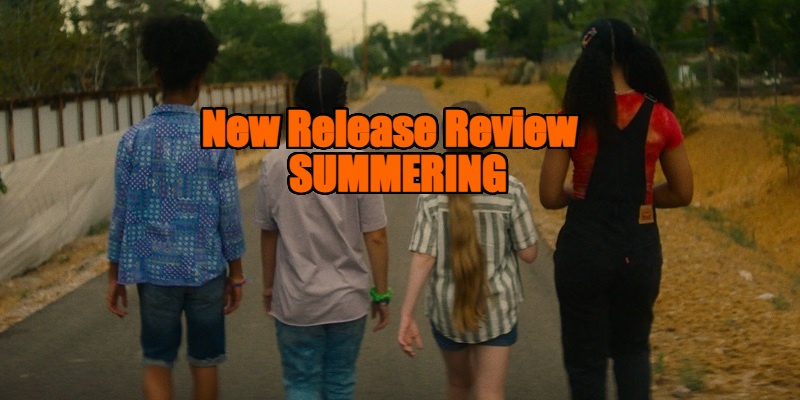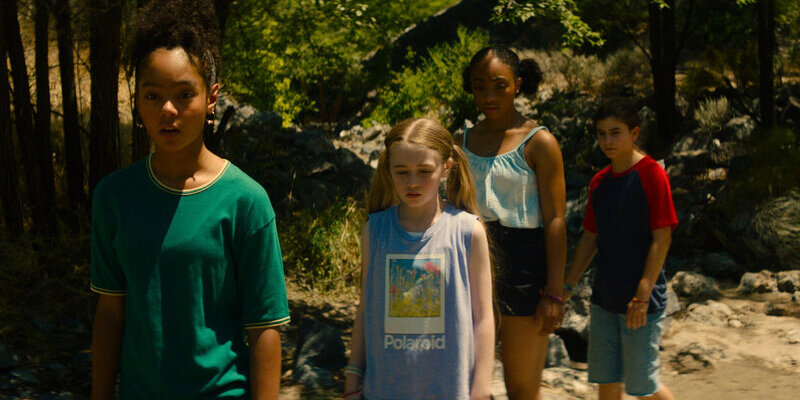
Review by
Eric Hillis
Directed by: James Ponsoldt
Starring: Lia Barnett, Madalen Mills, Eden Grace Redfield, Sanai
Victoria, Megan Mullally, Lake Bell, Sarah Cooper, Ashley Madekwe

"What the hell am I watching?" is a question you may ask yourself at
several points during director James Ponsoldt's tonally baffling
coming-of-age drama Summering. With a premise involving four young girls who discover a dead body,
comparisons to Stand by Me have been made. There's one key
difference though. In Rob Reiner's adaptation of Stephen King's story, the
body is only discovered at the end of the movie, with the bulk of the
narrative concerning the young boys' journey to take a look at the corpse
for themselves. The boys' initial bravado soon gives way to a crushing
acceptance of the darker side of life once they reach their grisly
destination. In Summering, the body is discovered at the beginning of the movie, and the subsequent
actions of the quartet of kids who find it, and those of several adult
characters, will leave you scratching your head in puzzlement.
It's the final weekend of the summer before pre-teen friends Daisy (Lia Barnett), Dina (Madelen Mills), Mari (Eden Grace Renfield) and Lola
(Sanai Victoria) have to enter middle school, and they plan to make
the most of their last days of freedom. On a pilgrimage to "Terabithia," a
tree they've adorned with trinkets of their childhoods, they come across the
corpse of a man in a cheap suit who they surmise threw himself from a nearby
bridge. Or was he pushed?

Mari, the one Catholic among the quartet, is hit with immediate guilt and
suggests the obvious - calling the cops. But Dina, who is both the smartest
and coldest of the group, talks the others into keeping the discovery a
secret. Obsessed with TV crime shows, Dina suggests she and her friends
investigate the man's identity themselves, and if they haven't made any
progress by Sunday they'll tell their parents. With nothing to go on but a
book of matches from a local bar, the girls begin their Nancy Drew
act.
I'm not trying to be funny by drawing a Nancy Drew comparison, as despite
its grim setup, Summering is very much a Young Adult movie.
The trouble is, Ponsoldt and co-writer Benjamin Percy can't decide if
they're making their movie for an audience the same age as their young
protagonists or for adults. The pair certainly don't seem to have an ear for
how young girls speak. Most of the clunky dialogue involves the girls
discussing the differing methods of child-rearing their parents employ,
which gives the filmmakers an opportunity to indulge in some cringy
sermonising. At one point Lola talks about how her hippy-dippy artist mom
(Sarah Cooper) doesn't allow her to watch the sort of TV crime dramas
Dina loves so much, as they involve "men killing girls and men saving
girls." It's a crude piece of writing that feels like nothing more than a
writer shoehorning a thought they've had themselves onto a character it
doesn't fit. Elsewhere there are TV movie clichés like Daisy returning home
to find her alcoholic mom (Lake Bell) passed out on the couch, taking
a half-empty glass from her hand before she goes to bed.

The biggest issue with Summering is that it never seems to
understand how distasteful its premise really is. The movie requires us to
be invested in the apprehensions of a group of middle-class kids who turn a
homeless man's corpse into a summer project. Every time one of the girls
talks about her personal fears - whether her absent Dad will ever return,
whether her friends will keep in touch when she leaves for Catholic school
etc - we're left to roll our eyes and think "Yes, that sucks, but can you
please call the bloody cops already???" The movie hits a real low in a
Weekend at Bernies-esque sequence that sees the girls pose the corpse for a photo as it emits
farts.
If I was being kind I might suggest that Ponsoldt is making a point about
how middle-class Americans are so hung up on trifling issues that they
ignore the plight of the country's lower classes. But nothing about
Summering suggests that Ponsoldt wants us to view his young
protagonists with scorn. If that were the case he wouldn't have made them so
damn likeable.

And there's the rub. For all its flaws and the bitter taste it leaves,
Summering is eminently watchable. This is solely down to how
engaging its young leads are. Barnett, whose Daisy is posited as the central
figure and gets an intermittent voiceover that the movie seems to forget
about, is the most amateurish of the four but this lends a vulnerability to
her character, who is the only one of the girls dealing with a genuinely
troubling issue in the absence of her father. We want to reach into the
screen and give her a reassuring hug. On the other end of the spectrum is
Renfield, who displays a gift for comic timing well beyond her years. Every
time she speaks or makes a gesture you can't help but giggle, though often
in moments where humour is wildly inappropriate.
The most interesting performance comes from Mills. Her Dina doesn't get the
showy moments of the other girls, but Mills tells us a lot about her
character through her silence. When the other three are joking, Dina often
remains stone-faced, and we can't help but feel that she's outgrown this
group of friends. Her older sister suggests that she might be the "mean
girl" of the group, but Dina is simply more mature than her friends, or at
least she believes that to be the case. Every time Mari makes an impassioned
plea that the group remain friends forever, Dina tellingly refuses to
respond. We get the sense that she will find a new group of friends in
middle school, and sadly, that she realises inter-racial friendships are all
too rare among "grown-up" Americans. Mari's fears that attending Catholic
school will spell the end of her friendship with the others is a similarly
damning indictment of the cultural divisions that persist among Americans.
These are interesting notions for a coming-of-age movie, but as with the
film's talented young leads, it's a shame they're in such a mess of a
movie.

Summering is in UK/ROI cinemas from
December 2nd.

